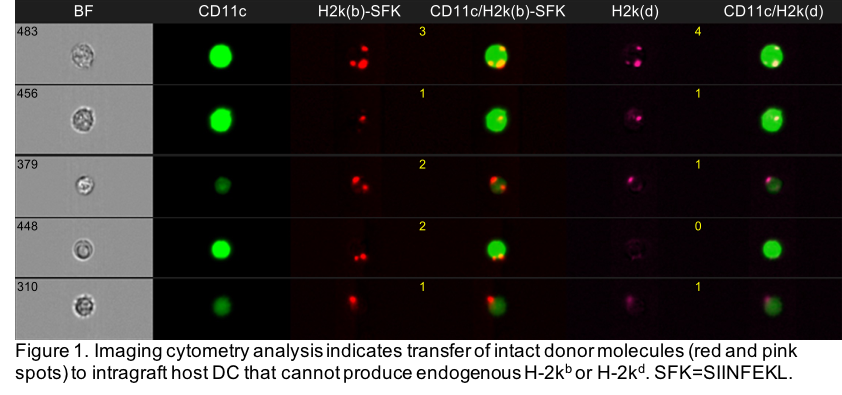Host-Derived, Intragraft Dendritic Cells Are Extensively Cross-Dressed by Donor MHC.
Starzl Transplantation Institute, University of Pittsburgh School of Medicine, Pittsbugh, PA
Meeting: 2017 American Transplant Congress
Abstract number: 111
Keywords: Antigen presentation, Host cells, Rejection, T cell activation
Session Information
Session Name: Concurrent Session: Innate Immunity
Session Type: Concurrent Session
Date: Sunday, April 30, 2017
Session Time: 4:30pm-6:00pm
 Presentation Time: 4:42pm-4:54pm
Presentation Time: 4:42pm-4:54pm
Location: E350
Host dendritic cells (DC) are the primary driver of transplant rejection in secondary lymphoid tissues where they activate alloreactive T cells. Directly alloreactive T cells comprise the vast majority of responding T cells and the manner of presentation of antigen to these cells by host DC is via cross-dressing, or acquisition of intact MHC molecules loaded with peptide from donor cells. Within the transplanted tissue host DC also play a significant role in rejection where they replace donor DC (>95% of all DC by day 3-7) and interact with T cells to sustain rejection. It is unclear how host DC in the graft acquire and present antigen to T cells. To investigate if cross-dressing of host DC within the graft is a major pathway of antigen presentation we created islet transplant combinations that restrict the source of MHC and antigen separately (Table1). Following adoptive transfer of OT-I CD8 effector T cells that are restricted to OVA peptide presented in the context of H-2kb (H-2kb-SIINFEKL), interaction of OT-I with host DC within the graft was recorded by intravital multiphoton microscopy on day 7 after transplantation. OT-I cell number and host DC-OT-I interactions in group I were comparable to those observed in group IV in which both donor and recipient were H-2kb sufficient. In contrast, H-2kb-/- grafts transplanted to H-2kb-sufficient recipients (group II) exhibited much less OT-I cell infiltration and host DC-OT-I interactions. The results were confirmed by imaging cytometry in that >40% of host DC isolated from group I grafts carried donor H-2kb-SIINFEKL and/or H-2kd on their surface (Fig1). Our data indicate that extensive cross-dressing of host DC occurs in the graft, allowing host DC to recruit directly-alloreactive T cells and sustain rejection in situ.

CITATION INFORMATION: Hughes A, Dai H, Williams A, Oberbarnscheidt M, Morelli A, Lakkis F. Host-Derived, Intragraft Dendritic Cells Are Extensively Cross-Dressed by Donor MHC. Am J Transplant. 2017;17 (suppl 3).
To cite this abstract in AMA style:
Hughes A, Dai H, Williams A, Oberbarnscheidt M, Morelli A, Lakkis F. Host-Derived, Intragraft Dendritic Cells Are Extensively Cross-Dressed by Donor MHC. [abstract]. Am J Transplant. 2017; 17 (suppl 3). https://atcmeetingabstracts.com/abstract/host-derived-intragraft-dendritic-cells-are-extensively-cross-dressed-by-donor-mhc/. Accessed February 15, 2026.« Back to 2017 American Transplant Congress
